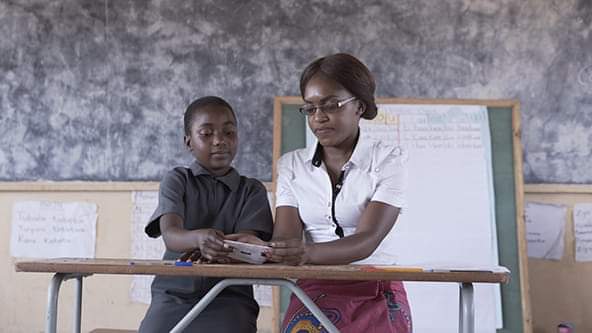EDUCATION: The 'Akara' School System and the Decline of Modern Pre-School Standard in Nigeria By Abai Francis

In the southern part of Delta State, some call it 'Atakara' while others simply refer to it as 'Akara'. Yes, that was the name used then, in those days, for the modern day pre-school or kindergarten system of education. I doubt if those born in the 90's ever had the 'Atakara / Akara' educational experience, but for what I know, that school system was very popular in the 70s and 80s.
The term 'Akara' is the local parlance used to refer to bean cake, a fried food product made from the paste of beans after it has been blended (smoothened by grinding) with ingredients such as onions and peppers, among others, added. The bean cake (akara), mostly as a breakfast food, was seen back then as a favourite for the less privilege or the poor in society. Hence the export of the term 'Akara' to the pre-school system of education operated back then, especially as it was organised, so to say, for those beginners with a poor background.
As I reflect back on the 'Akara' school system, I am reminded of my 'black slate' artistically designed and painted with the alphabet and few numbers in white on one side, and with the other side of the slate kept blank for writing purpose. I also remember my cup of pebbles (an empty milk tin filled with stones) for use in counting, and my box of chalks for writing on the blank side of the slate. I also remember hanging the rope of my 'black slate' around my neck as I carry it with pride while joining other peers gleefully as we march to school every morning. And while we looked decent when leaving for school, our chalked-stained bodies paints a different picture all together when returning from school.
In those days, just as there were no note books and fanciful pen for us to write with, so too our teachers had no access to white board and marker, but made use of the blackboard with chalk. The school, which was a private-ownership driven enterprise had no sophisticated plastic chairs for comfort. While the fanciful wooden chairs were meant for our teachers, we (the pupils) often squatted on makeshift chairs or on the floor as we chorused away in reciting the alphabet, the national anthem, some poems and what have you...
Fast-forward today, educational learning infrastructures have no doubt, improved! In most places today, the term 'Akara' school has been replaced with the names: pre-school, nursery or kindergarten. There is no black slate, no more carrying heavy cans filled with pebbles and box of chalks as learning materials. Instead, there are books and pens. Moreover, there are now sophisticated electronic-driven materials for learning the pronunciation of alphabets and numbers (that is, if parents can afford them), among other learning innovations developed overtime.
But in all of these positive developments, it seems the pre-school standard of education is still in its pariah state and has not improved much; if anything else, its value is decreasing daily. I believe this problem springs from attitude and from a modern generation with declining moral values.
To begin with, back then, learning in the 'Atakara' school was never the easy way, but the disciplined way when compared to today's pre-school. In those days you hardly hear of child molestation as those entrusted with the responsibility to care for pupils carry out such tasks with a high sense of dignity and dedication to duty backed with the fear of God. Secondly, teachers weren't teaching for the sake of money, but poured all their hearts and souls into the discipline. Their pride, which is more of a reward, is to see their pupils emerge among the best. Also, apart from the fact that money was never a motivator, they also love teaching which they patriotically believe is part of their own contributions to the development of the local, state, country, and even the world at large.
But the story is totally different today. Money is at the center of everything! Despite the hike in fees, the performance of most pupils is nothing to write home about. And because most parents are too busy chasing money they hardly take cognisance of this fact. In order to make up for this deficiency, we now have most of the schools conducting extra lessons with additional costs borne by parents who are already overloaded with the economic misfortunes of the country. Another option available that guarantees quality education in its highest standard is for parents to enroll their wards in top-notch schools with private ownership like the 'Akara', but only this time with extravagant fees outside the reach of most poor parents. Thus, foundational education, which is supposed to be affordable to all irrespective of class or status, is now a means of discrimination.
Foundational education deserves all the focus and attention it could get. If a country gets its education at the beginning stage wrong, no matter the sophistication in its tertiary level, the end result would always be catastrophic. And so, while there is call on the government to provide the needed advanced learning Infrastructures in the tertiary level it should do even more at the foundational level. This is because the nation stands to benefit more in the long term as well as guarantee the future sustenance of educational investment if its educational foundation is solid. But more importantly, asides ensuring the boosting of quality in learning, the government should make access to qualify education affordable if not free.
Also, modern day teachers need to be reorientated on the teaching profession; they need to understand that they are the new heroes of our time we all look up to, meaning that they bear a greater responsibility in nation building. They need to accept the fact that the nature of their profession imposed on them the need to be more patriotic when rendering their services. Need I remind us that due to the high rate of unemployment, today's teaching profession has been taken over by those who have no calling or affection for teaching, which is one of the root causes of substandard education in the foundational level.
Image Credit: Stanford Social Innovation Review
#mypublicdiscourse



